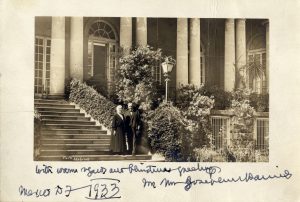On this day in 1919: Professor Frederick Koch’s Carolina Playmakers debut with a trio of short plays in the Chapel Hill High School auditorium. Leading the bill: “The Return of Buck Gavin, A Tragedy of the Mountain People,” written by Thomas Wolfe, who also plays the part of Buck.
Among Prof Koch’s other notable early students: Paul Green, Jonathan Daniels and Frances Gray (Patton). By 1928 Brooks Atkinson of The New York Times will write that “what Professor Koch has accomplished, not only in Chapel Hill, but through the state, is nothing short of extraordinary.”
…
You can see costume items from “The Return of Buck Gavin” in the North Carolina Collection Gallery exhibit “Making a People’s Theatre: Proff Koch and the Carolina Playmakers,” from now until May 31.

